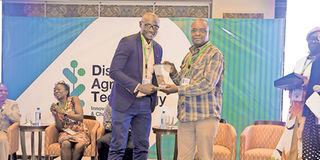How agri-techies wowed the world

UjuziKilimo business development executive director, Dickson Ayuka receives a World Bank recognition award from Kisii agribusiness executive, Osman Onsarigo. World Bank last week unveiled 14 innovators in Kenya as the first cohort of a million farmers expected to benefit from a grant to help them grow. PHOTO | PAULINE KAIRU | NMG
What you need to know:
- Fourteen companies to share a Sh100 million grant for innovations that make farming more fruitful and enjoyable.
- The challenge, which ran from April 5 to 6, was categorised into production, data analytics and financial inclusion.
- The selection required participants to have tried their technology on at least 3,000 farmers and developed a concept with a viable and sustainable business for at least two years.
- Winners were also required to show evidence of impact on productivity, with a focus on smallholder and women farmers; showcase engagement with other players and demonstrate how they could reach at least 10,000 farmers in two years.
As drought and other conditions threaten food security, climate-smart agriculture is increasingly gaining momentum. And the innovators are getting rewarded.
Last week, the World Bank unveiled 14 innovators in Kenya as the first cohort of a million farmers expected to benefit from a grant to help them grow.
The ‘One Million Farmer Initiative’ was formed by The World Bank, the Ministries of Agriculture and ICT, the Korea-World Bank Partnership Facility, Kuza Technologies, Dalberg and the United Nations.
Experts say technology like apps, climate-smart seeds, financial services or data analytics can improve yields and income.
The challenge, which ran from April 5 to 6, was categorised into production, data analytics and financial inclusion.
The first group of the innovators, along with two other cohorts to be selected annually, will be eligible for competitive grants totalling $100 million.
They will also have access to in-kind “incubation” support for 12 to 18 months. “New technology has the ability to transform Kenya’s agriculture. Telecoms have shown the ability of technology to radically disrupt the status quo. It is time farmers harnessed this potential,” Jeehye Kim, an agricultural economist at the World Bank, said.
The selection required participants to have tried their technology on at least 3,000 farmers and developed a concept with a viable and sustainable business for at least two years.
Winners were also required to show evidence of impact on productivity, with a focus on smallholder and women farmers; showcase engagement with other players and demonstrate how they could reach at least 10,000 farmers in two years.
Digital Green
This is a video-enabled approach that tries to bridge the gap between extension officers and farmers.
“We train extension workers to amplify their roles. Videos that run for eight to 10 minutes are produced for farmers by farmers on their farms,” Henry Kinyua, head of Digital Green East Africa, said.
The videos are produced in vernacular.
The firm established a consortium code-named ‘mango working group’ for fruit farmers. It will run a campaign on the control of fruit flies.
Kinyua hopes county governments can use Digital Green as one of their extension tools.
“We are targeting 10,000 people in Makueni in the first year then 250,000 mango farmers across Kenya,” he said
The interactive videos are also available for other platforms like WhatsApp and Facebook.
Digi-Cow
Digi-Cow founder Peninah Wanja was an agricultural extension officer with the government, besides establishing her dairy farm.
This is how she came face to face with the biggest challenge facing the more than a million small holder farmers who own 3.5 million dairy cows: poor or no record keeping.
“Most farmers get about 10 litres per cow daily against a potential of 30,” she said.
Digi-Cow is installed from google play store after which one keys in important details. A farmer then gets alerts.
“We enable farmers make data- driven decisions. Those without smartphones are given audio-training,” she said at the event at Villa Rosa Kempinski.
The technology, in use since 2018, has reached 10,000 farmers. In the past six months it started vet-care services to 2,500 cows, an insurance fund for dairy cows as well as digital artificial insemination.
Digi-Cow allows farmers free access as the firm earns from advertising for vet services.
Farmers Pride
This is an app that connects farmers to the nearest agro-dealers the same way Uber taxis work.
The innovation is a combination of a franchise marketing model and a technology to bridge the gaps of access to farm inputs, services and information among rural farmers.
Whereas there is other technology that improves farm productivity, they remain inaccessible.
“It came because there is poor distribution of agricultural services and information in rural areas,” Samwel Muguti, the executive director of Farmers Pride, says.
“There are more than 11,000 rural agro-vets in Kenya so we geo-map and register them on our platform.”
Farmers Pride has six digital franchise stores and 100 agro-vets who have reached 10,000 farmers. It targets 500,000 farmers in the next five years.
“The stores are a one-stop platform where farmers can access anything,” Muguti said.
Ujuzi Kilimo soil kit
Pioneered in 2017 by Brian Bosire, this soil testing technology provides precise and useful information to farmers using sensors and phones.
The gadget has sensors that produce signals that are conditioned to show the exact amount of ions and nutrients in the soil sample by measuring pH, salinity, nitrogen, phosphorus, potassium and moisture. The information is sent to a farmer’s phone.
The kit is already in use in Murang’a, Nyeri, Kisii and Nyamira counties.
Agri-Wallet
An agri-wallet is a mobile cash transfer service. It helps farmers set aside funds in form of tokens in their phones which they can use to access inputs from dealers.
It is serving more than 15,000 farmers and is working towards scaling up to 100,000 by the end of the year.
Other innovations which received recognition are Precision Agriculture for Development, TruTrade Africa, Tulaa, M-Shamba, ACRE Africa, Astral Aerial, Oakar Services, Arifu and SunCulture.





